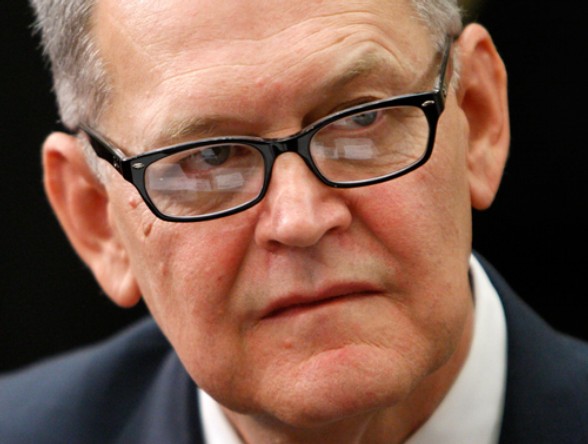Submitted by Wendell Potter on
I did exactly what the doctor told me to do. Unfortunately, I'm not feeling a bit better. Maybe even a little worse.
Last week, Dr. Michael C. Burgess, tweeted this directive: "Mark your calendars: Rick Perry will join Health Caucus' Thought Leaders Series next Wednesday, December 7 @ 5 p.m."
 Eager to hear what thought leadership the Texas governor and presidential candidate would be imparting, I marked my calendar as Dr. Burgess prescribed. Imagine my dismay when I learned yesterday morning that Perry would be sharing his thoughts behind closed doors. The media and public, it turns out, had been disinvited.
Eager to hear what thought leadership the Texas governor and presidential candidate would be imparting, I marked my calendar as Dr. Burgess prescribed. Imagine my dismay when I learned yesterday morning that Perry would be sharing his thoughts behind closed doors. The media and public, it turns out, had been disinvited.
Burgess, a Texas Republican, chairs the Congressional Health Care Caucus, which, according to its Web site, "is committed to advancing reforms that reduce costs, increase patient control, expand choice, and promote cures."
Committed as it may be, the caucus is composed of Republicans only, and most of the thought leaders who have appeared before it in recent months have been Republicans running for president.
Last month, both Herman Cain and Ron Paul spoke to the caucus. Newt Gingrich was the guest of honor last spring. But unlike yesterday's meeting of the caucus, all of those were open to the public and media and streamed live on the Internet.
Burgess said it was the Perry campaign's request to close the meeting, not his.
Why So Secretive?
 "They have asked that it be closed to the press, and we are respecting their wishes," Burgess was quoted in The Washington Post as telling reporters in the Capitol Tuesday night.
"They have asked that it be closed to the press, and we are respecting their wishes," Burgess was quoted in The Washington Post as telling reporters in the Capitol Tuesday night.
Why would Perry insist on sharing his thoughts with just a handful of GOP lawmakers?
We'll probably never know for sure, but I suspect that if the truth were to be known, it would be because Perry didn't cotton to having to answer questions about two reports published this week, both of which show that, by many measures, health care has gone from bad to worse since Perry became governor 11 years ago this month.
Perry has not said much to any audience about what he would do to address the many problems with the U.S. health care system other than to repeal "Obamacare." One of the few things he has pointed to as a major accomplishment during his time in office is tort reform. With his strong backing, Texas in 2003 instituted liability caps that limit the amount of money plaintiffs can collect if they prevail in medical malpractice suits against doctors. Patients in Texas can receive no more than $250,000 in non-economic damages as a result of the caps.
Perry has bragged that doctors have flocked to Texas since 2003 because of the medical malpractice damage caps, and that those caps have helped control health care costs in the state.
On Tuesday, however, the consumer advocacy group Public Citizen released a study that debunks those claims.
"While litigation over malpractice in Texas has plummeted dramatically since the caps were imposed, residents of Texas -- except for people with financial connections to liability insurance companies and, to a lesser extent, doctors -- have realized few, if any, benefits," Public Citizen said in a statement accompanying the study. "Instead, the health care picture in Texas has worsened significantly by almost any measure."
Oops.
Public Citizen's study found that Medicare spending has increase faster in the Lone Star state than the nation as a whole, and that outpatient service costs covered by Medicare have also exceeded national averages.
"More Texans lack health insurance, the per capita number of doctors has not increased noticeably, and premiums for private health insurance have increased at a rate higher than the national average," according to the study.
Texas is the "Uninsured Capital of the United States"
The study was based in part on U.S. Census data, which shows that Texas continues to be -- as the Texas Medical Association put it a few years ago -- "the uninsured capital of the United States."
More than 26 percent of Texans are uninsured, the highest rate in the country. That means that about 6.3 million Texas -- men, women and children -- have no health insurance. That's almost exactly the population of my home state of Tennessee. An analysis by the Texas Medical Association a few years ago showed that children were especially disadvantaged in Texas: a full 30 percent of Texas kids were uninsured in 2006-2007.
 The other study that came out this week that Perry undoubtedly hopes no one will notice came from the Association of American Medical Colleges. The AAMC reported that Texas ranks 48th in the number of active patient primary care physicians per 100,000 population. There are just 62 primary care doctors per 100,000 people in Texas compared to the national median of 80.
The other study that came out this week that Perry undoubtedly hopes no one will notice came from the Association of American Medical Colleges. The AAMC reported that Texas ranks 48th in the number of active patient primary care physicians per 100,000 population. There are just 62 primary care doctors per 100,000 people in Texas compared to the national median of 80.
Citing the AAMC report, Alex Winslow, executive director of the citizen advocacy organization Texas Watch, said that, "Despite rhetoric to the contrary, the data proves that Texas continues to fall far behind in access to health care. Texas patients need meaningful reforms that improve the cost, quality and access to health care -- not empty rhetoric and hollow promises."
That is not something that just Texas patients need. So do the rest of us. What do you say to that, Gov. Perry?

Comments
Joleen Chambers replied on Permalink
Medical and Legal Purgatory
Catich replied on Permalink
health